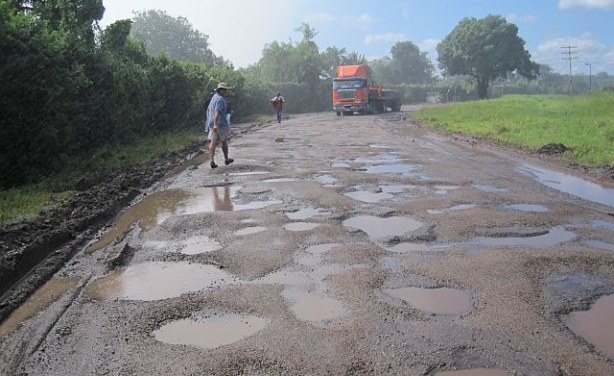Nhimbe/ilima Initiative to Enhance Coordination and Resource-Sharing Among Regional Authorities for Road Rehabilitation
Zimbabwe is embarking on a significant road rehabilitation initiative called “Nhimbe/ilima” (which translates to Working Together) to address critical infrastructure needs in the region. This collaborative effort aims to enhance coordination and resource-sharing among various roads authorities in the province, ensuring efficient and effective road maintenance and improvements.
Permanent Secretary for Provincial Affairs and Devolution in Bulawayo Metropolitan province, Paul Nyoni highlighted the importance of Nhimbe ilima during a recent interview held on the sidelines of a breakfast meeting held at Bulawayo Polytechnic.
Nyoni explained that the initiative follows in the footsteps of the previously successful Emergency Road Rehabilitation Program (ERRP) but with an expanded focus on collaboration and joint planning.

The ilima initiative brings together roads authorities, such as the ZINARA and Bulawayo City Council, to collectively identify priority roads, assess available resources, and develop a coordinated plan of action for rehabilitation projects.
By pooling their capacities, including equipment, human resources, technicians, and architects, the authorities aim to optimise their efforts and effectively address the region’s road infrastructure needs.
“The government has recently launched something called Nhimbe ilima, a collaborative system which is basically enhancing the kind of collaboration that we had under ERRP,” Nyoni explained.
He emphasised the goal of ensuring that the various roads authorities in Bulawayo work together, rather than compete for limited resources, in order to maximise the impact of road rehabilitation projects.

In preparation for the initiative, the provincial authorities have already conducted preliminary meetings to select the most impactful roads for rehabilitation and assess their capacity to undertake the projects.
“We’ve had our preliminary meetings to select the roads that we think are important to the province. And once we’ve concluded those, we’ve also submitted what capacities we have,” Nyoni shared.
He highlighted the comprehensive nature of these capacity assessments, accounting for all the necessary resources, from equipment to personnel, required for successful road construction and maintenance.
The government plans to make a formal announcement of the selected road projects in the coming months, after finalising the planning phase.
Nyoni emphasised that this collaborative approach will address the capacity challenges faced during the previous ERRP program, where multiple roads authorities competed for the same limited resources. By working together, the authorities will ensure that resources are allocated strategically and projects are executed efficiently.
“Instead of having three or four road authorities competing for the same resources, we are saying the three or four road authorities come together and collaborate,” Nyoni explained.
He outlined the importance of project-focused collaboration, allowing the authorities to collectively seek the resources they require to meet the specific needs of each road construction project.
The ilima initiative is being led by the Ministry of Local Government, emphasising the commitment of the government to address development challenges, health issues, and industrial needs through collaborative efforts. Provincial secretaries play a vital role in coordinating the collaboration between the various roads authorities in their respective regions.
By launching the collaborative system for road construction in Bulawayo, the Zimbabwean government aims to tackle common development challenges and improve infrastructure through enhanced coordination and resource-sharing among roads authorities. The Nhimbe ilima initiative represents a promising step towards efficiently addressing the road infrastructure needs of the region, ultimately enhancing the lives of the residents and supporting the overall development of Bulawayo and surrounding areas.
A new programme targeting road rehabilitation in residential areas named Nhimbe/Ilima or Mushandirapamwe, is being rolled out nationwide, as the Government intensifies the upgrading and maintenance of roads.
The provincial government of Bulawayo and surrounding areas are launching a collaborative road rehabilitation initiative dubbed “Nhimbe ilima” to address the region’s critical infrastructure needs, a top government official announced.
In an interview on the sidelines of a Bulawayo Polytechnic breakfast meeting, Paul Nyoni, the Permanent Secretary for Provincial Affairs and Devolution, said the new project aims to enhance coordination and resource-sharing among various roads authorities in the province.
“It was actually in the news. The government has recently launched something called Nhimbe ilima, a collaborative system which is basically enhancing the kind of collaboration that we had under ERRP,” Nyoni said, referencing the previous Emergency Road Rehabilitation Programme.
Under the Nhimbe ilima initiative, roads authorities such as the Department of Roads and Bulawayo City Council will sit together to identify priority roads, assess their collective capacity, and develop a coordinated plan of action.
“Basically what government has launched, has recently launched is to say, roads authority is in a space like Blower is Department of Roads and BCC. So, sit together, identify a few roads, look at your capacities, all your capacities, equipment, human resources and all other capacities that you need to build a road and say to yourselves, which road do you want to focus on over the next three months, for instance,” Nyoni explained.
The funding for the road projects will come from the Ministry of Finance and the Silveira House, a prominent development organization. Nyoni said the provincial authorities have already held preliminary meetings to select the most impactful roads and compile their respective capacity assessments.
“We’ve had our preliminary meetings to select the roads that we, the impactful roads that we think are important. To the city, to the province. And once we’ve concluded those, we’ve also submitted what capacities we have. And when I talk about capacities, right down to the last piece of item, from right down to the grader, right down to the technician, to the architects, we’ve come together and counted everybody and said, with this capacity, if we get this money, we are going to do these roads,” Nyoni said.
The government plans to make a formal announcement of the selected road projects in the coming months. Nyoni noted that this collaborative approach aims to address the capacity challenges faced during the previous ERRP program, where multiple roads authorities competed for limited resources.
“Instead of having three or four road authorities competing for the same resources, we are saying the three or four road authorities come together and collaborate. So whatever they are going to seek, they are going to seek together and focus on a project by project by project basis,” Nyoni said.
The Nhimbe ilima initiative is being led by the Ministry of Local Government, with provincial secretaries playing a key role in coordinating the efforts of various roads authorities in their respective regions.
In a bid to tackle common development challenges and health issues, the Zimbabwean government has launched a collaborative system called “Nhimbe ilima” for road construction. The initiative aims to address the country’s development challenges, health challenges, and industrial challenges by working together and exchanging ideas. The system will enhance collaboration between various roads authorities in Bulawayo, with the government providing the necessary funding.
During a side interview at the Bulawayo Polytechnic breakfast meeting, Permanent Secretary for Provincial Affairs and Devolution Affairs, Paul Nyoni, emphasized the importance of the initiative, highlighting the similarities between Zimbabwe and Bulawayo in terms of heritage and indigenous knowledge systems. By tackling similar problems and utilizing shared values, collaboration becomes a clever and effective approach.
Nyoni explained that the collaborative system will bring together roads authorities, such as Blower is Department of Roads and BCC, to plan and identify the roads they want to focus on over the next three months. The authorities will assess their capacities, including equipment, human resources, technicians, and architects, to determine the resources needed for each road construction project. The funding for the projects will come from Sinara and the Ministry of Finance.
The preparatory meetings have already taken place, with the roads authorities selecting impactful roads that are important to the city and province. Nyoni expressed that once the planning stage is complete, an announcement will be made regarding the specific roads that will be constructed under the collaborative system.
When asked about how this initiative addresses the shortcomings observed during the implementation of the previous Economic Recovery and Reconstruction Program (ERRP2), Nyoni acknowledged the challenges caused by having nearly a hundred roads authorities seeking the same services simultaneously. He stated that the collaboration between the roads authorities will address this issue by eliminating competition for resources. Instead of each authority individually competing for resources, they will now work together and focus on projects on a project-by-project basis. This will ensure that resources are utilized more efficiently and effectively.
Specific details regarding the roads that have been identified in Bulawayo were not disclosed during the interview. Nyoni mentioned that the list of roads has already been compiled, and once approved, an announcement will be made. This indicates that the government is still in the planning stage of the collaborative system for road construction.
The Ministry of Local Government is leading the government project, with provincial secretaries and roads authorities working collaboratively to plan and execute the road construction projects. The launch of the collaborative system is a promising step towards addressing development challenges in Bulawayo, improving infrastructure, and ultimately enhancing the lives of the people in the city and province.
#News in Bulawayo #News in Zimbabwe Artist Arts BCC Bulawayo Bulawayo City Council Bulawayo economy Bulawayo industry Bulawayo news Bulawayo Police Bulawayo Water Bulawayo Water Crisis Bulawayo Women entrepreneurship Business Women Cholera Community Culture Currency Drug Abuse Drugs Economy Farmer Farmers Farming Informal Sector Informal Traders Mining MSMEs Music News in Bulawayo News in Zimbabwe Police Police in Bulawayo Vendor Vendors water Water Crisis Water Shortage water supply issue Women entrepreneurship ZESA Zimbabwean economy Zimbabwe news Zimbabwe water crisis ZRP
Join us for all News in Bulawayo and Bulawayo News in Zimbabwe.












